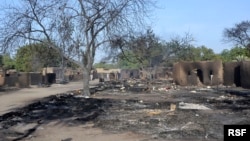A female suicide bomber in Nigeria killed at least 10 people and injured 30 more Sunday when she blew herself up at a crowded bus station.
The explosion occurred in the northeastern city of Damaturu in Yobe state, with authorities and witnesses saying a girl managed to elude security at a checkpoint before setting off the blast. The French news agency said an angry mob prevented rescue workers from evacuating the remains of the bomber and set her body parts on fire.
Witnesses said many of the victims of the attack were children selling goods at the bus station.
No one claimed responsibility for the attack, but it occurred in a region where Boko Haram, Nigeria's Islamic extremist group, has increasingly used young women to carry out its attacks as it attempts to impose a religion-based control across northern Nigeria.
A week ago, Nigeria postponed national elections for six weeks that had been set for Saturday, saying that Boko Haram posed too big a security threat. The militants warned people against participating in the election or risk being killed. Boko Haram leader Abubakar Shekau has repeatedly said democracy is un-Islamic.
In an interview with VOA, Nigerian Vice President Namadi Sambo called on his countrymen to "stop being violent." He said Nigeria's security foces wanted more time to prepare to ensure the election is safe. He added that politicians have a big role to play in ensuring the election is free from violence.
On Saturday, the governor of neighboring Gombe state imposed a 24-hour curfew in response to a Boko Haram attack on Gombe city. Details about the attack were not clear and some reports said the militants took their wounded and the bodies of their dead after the siege.
Reports from the area said the militants circulated a letter warning residents not to come out for the upcoming general elections
Boko Haram, Nigeria's homegrown Islamic extremist group, caused an estimated 10,000 deaths last year, AP reported.
The group's violent campaign is increasingly spilling over into neighbors Cameroon, Chad and Niger, and those attacks have been seen as a response to those nations joining in a regional military offensive designed to crush the uprising.
Nigeria last weekend postponed for six weeks a national election that had been set for February 14, citing the security threat from Boko Haram.
President Goodluck Jonathan's rival in the election, which has been rescheduled for March 28, former military ruler Muhammadu Buhari, is seen as the tougher of the two on the security issue, having quelled an Islamist uprising in the 1980s.
Curfew imposed
On Saturday, the governor of neighboring Gombe state imposed a 24-hour curfew in response to a Boko Haram attack on Gombe city.
Details about the attack were not clear and some reports said the militants took their wounded and the bodies of their dead after the siege.
Reports from the area said the militants circulated a letter warning residents not to come out for the upcoming general elections
On Friday, President Jonathan told the Wall Street Journal that he has been asking the United States for more help to fight Boko Haram. He told the newspaper that the militants are receiving training and funds from the Islamic State, the jihadist group operating in Iraq and Syria.
According to the article, Jonathan said the United States is a friend who is fighting the same Islamist forces and should aid Nigeria with combat troops.
Pentagon spokesman, Rear Admiral John Kirby, said there are no plans to unilaterally send U.S. troops to Nigeria, however discussion is getting started on forming a multi-national task force that the international community is working with certain African nations to establish.
Some material for this report came from Reuters, AP and AFP.





